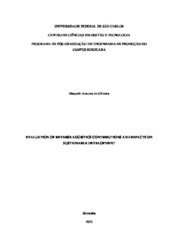| dc.contributor.author | Oliveira, Maquele Antunes de | |
| dc.date.accessioned | 2023-06-05T18:00:34Z | |
| dc.date.available | 2023-06-05T18:00:34Z | |
| dc.date.issued | 2023-05-11 | |
| dc.identifier.citation | OLIVEIRA, Maquele Antunes de. Evaluation of reverse logistics contributions and impacts on sustainable development. 2023. Dissertação (Mestrado em Engenharia de Produção) – Universidade Federal de São Carlos, Sorocaba, 2023. Disponível em: https://repositorio.ufscar.br/handle/ufscar/18112. | * |
| dc.identifier.uri | https://repositorio.ufscar.br/handle/ufscar/18112 | |
| dc.description.abstract | Global concern around sustainable development has increased and production practices that can contribute to this have gained prominence – with reverse logistics (RL) being one of these. However, the topic is still emerging and requires new efforts. The definition of which contributions reverse logistics can bring to sustainability is still inexact. The research aim is to extend the understanding of the sustainable impacts that RL can generate economically, environmentally and socially and to define which SDGs (Sustainable Development Goals) are the most impacted by RL adoption. In addition, it is intended to contribute to the production of knowledge related to RL and sustainability in its three dimensions – where there is a lack of studies –; demonstrate to companies interested in increasing their adherence to the global SDG pact how the adoption of RL can benefit them; identify the main impacts of RL for sustainable development and elucidate how RL adoption can help the achievement of the SDGs. For these purposes, the research will make use of: (i) a systematic literature review in order to gather the empirical evidence of RL impacts on sustainability, (ii) expert elicitation through the IDEA protocol to evaluate the relation between RL and the SDGs and (iii) VIKOR to the analysis and to define which SDGs are the most impacted by the adoption of RL practices. It was found in literature that: the environmental pillar of sustainability is the one with more impacts reported; the social pillar still has minimum impacts reported – even with the great social contributions pointed for human welfare – and the RL impact most cited in literature was “improve profit and cost savings”. After the analysis in the second article presented in this dissertation, it was found that SDG 12 has the greatest contribution from RL adoption and SDG 1 is the one which has its accomplishment least driven by RL. At the end, instructions for further research are given. | eng |
| dc.description.sponsorship | Coordenação de Aperfeiçoamento de Pessoal de Nível Superior (CAPES) | por |
| dc.language.iso | eng | por |
| dc.publisher | Universidade Federal de São Carlos | por |
| dc.rights | Attribution-NonCommercial-NoDerivs 3.0 Brazil | * |
| dc.rights.uri | http://creativecommons.org/licenses/by-nc-nd/3.0/br/ | * |
| dc.subject | Logística Reversa | por |
| dc.subject | Sustentabilidade | por |
| dc.subject | ODS | por |
| dc.subject | Economia Circular | por |
| dc.subject | VIKOR | por |
| dc.subject | Expert elicitation | por |
| dc.subject | Reverse Logistics | eng |
| dc.subject | Sustainability | eng |
| dc.subject | SDG | por |
| dc.subject | Circular Economy | eng |
| dc.title | Evaluation of reverse logistics contributions and impacts on sustainable development | eng |
| dc.title.alternative | Avaliação das contribuições e impactos da logística reversa para o desenvolvimento sustentável | por |
| dc.type | Dissertação | por |
| dc.contributor.advisor1 | Mendes, Juliana Veiga | |
| dc.contributor.advisor1Lattes | http://lattes.cnpq.br/5692633697407656 | por |
| dc.contributor.advisor-co1 | Santa-Eulalia, Luis Antonio de | |
| dc.contributor.advisor-co1Lattes | http://lattes.cnpq.br/9501843917802087 | por |
| dc.description.resumo | A preocupação mundial com o desenvolvimento sustentável tem aumentado e práticas produtivas que podem contribuir têm ganhado destaque – sendo a logística reversa (LR) uma dessas práticas. No entanto, o tema ainda é emergente e requer novos esforços. A definição de quais contribuições a LR pode trazer para a sustentabilidade ainda é incerta. Sendo assim, o objetivo da pesquisa é ampliar o entendimento sobre os impactos sustentáveis que a LR pode gerar econômica, ambiental e socialmente e definir quais ODS (Objetivos de Desenvolvimento Sustentável) são mais impactados pela adoção da LR. Além disso, pretende-se: contribuir para a produção de conhecimento relacionando a LR e sustentabilidade em suas três dimensões, onde há carência de estudos que o façam; demonstrar às empresas interessadas em aumentar sua adesão ao pacto global dos ODS como a adoção da LR pode beneficiá-las; identificar os principais impactos da LR para o desenvolvimento sustentável e elucidar como a adoção da LR pode ajudar no cumprimento dos ODS. Para esses fins, a pesquisa foi dividida em dois artigos, faz uso, respectivamente, de: (i) uma revisão sistemática da literatura para reunir as evidências empíricas sobre os impactos da LR na sustentabilidade, (ii) expert elicitation por meio do protocolo IDEA para avaliar a relação entre a LR e os ODS e (iii) VIKOR para análise e definição de quais ODS são os mais impactados pela adoção da LR. Concluiu-se através da literatura que: o pilar “ambiental” da sustentabilidade é o que tem mais impactos reportados; o pilar social ainda apresenta poucos impactos relatados na literatura – mesmo com as grandes contribuições sociais apontadas para o bem-estar humano – e o impacto de RL mais citado na literatura foi “melhorar lucro e economia de custos”. Através da expert elicitation e VIKOR também constatou-se que o ODS 12 é o que mais se beneficia da adoção da RL e o ODS 1 é o que menos tem o seu cumprimento impulsionado pela RL. Diversas sugestões para pesquisas futuras são também apontadas. | por |
| dc.publisher.initials | UFSCar | por |
| dc.publisher.program | Programa de Pós-Graduação em Engenharia de Produção - PPGEP-So | por |
| dc.subject.cnpq | ENGENHARIAS::ENGENHARIA DE PRODUCAO::GERENCIA DE PRODUCAO | por |
| dc.publisher.address | Câmpus Sorocaba | por |
| dc.contributor.authorlattes | https://lattes.cnpq.br/8392968715117922 | por |
| dc.contributor.authororcid | https://orcid.org/0000-0002-6577-861X | por |
| dc.contributor.advisor1orcid | https://orcid.org/0000-0003-4514-2558 | por |

